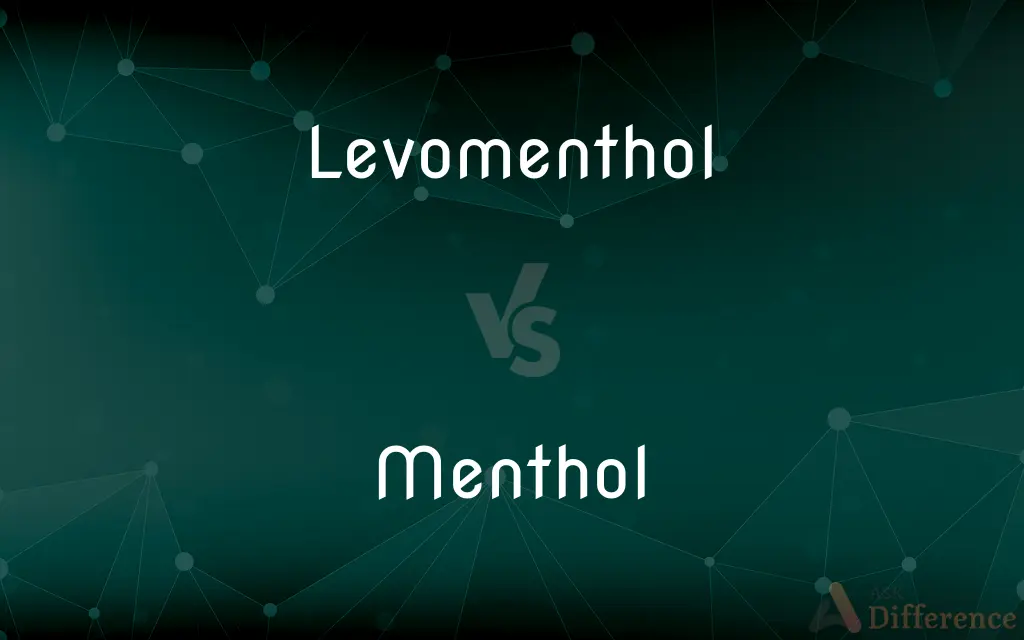Levomenthol vs. Menthol — What's the Difference?
By Tayyaba Rehman & Maham Liaqat — Updated on March 25, 2024
Levomenthol is a specific form of menthol with cooling properties, used in medicinal products, while menthol refers to a broader category of similar compounds found in mint oils.

Difference Between Levomenthol and Menthol
Table of Contents
ADVERTISEMENT
Key Differences
Levomenthol, a chemical compound derived from mint oils, is known for its minty aroma and cooling sensation on the skin and mucous membranes. It is specifically the left-handed enantiomer of menthol, which means it has a specific orientation in space that makes it distinct from other forms of menthol. On the other hand, menthol can refer to any of the eight stereo-isomers of menthol, including levomenthol, which all share similar minty characteristics but may differ slightly in their biological effects and uses.
Levomenthol is primarily used in medicinal and therapeutic products, such as ointments, cough suppressants, and topical analgesics, because of its ability to trigger cold-sensitive receptors in the skin, creating a cooling effect without actually lowering the temperature. Whereas menthol, in its broader application, is utilized not only in medicinal products but also extensively in food, cosmetics, and cigarettes for flavoring and fragrance purposes, thanks to its pleasant aroma and taste.
The production of levomenthol is usually through the synthesis or purification from natural sources, focusing on obtaining the specific enantiomer for its desirable effects. In contrast, menthol might be produced through similar methods but encompasses all its isomers, allowing for a wider range of uses across different industries, with each isomer having its unique properties and applications.
Due to its specific therapeutic properties, levomenthol is often found in higher concentrations in pharmaceutical products compared to other forms of menthol. Meanwhile, menthol, given its broader definition, can be found in varying concentrations and forms depending on the product's intended use, from low concentrations in food products to higher concentrations in topical analgesics.
The sensory effects of levomenthol, such as cooling and pain relief, are more targeted and researched in the context of medicinal use. In contrast, menthol's effects can vary based on the isomer and the product, ranging from flavoring agent to analgesic, highlighting the versatility and wide-ranging applications of menthol in general.
ADVERTISEMENT
Comparison Chart
Definition
The left-handed enantiomer of menthol, known for its cooling properties.
A broad category that includes levomenthol and other stereo-isomers of menthol.
Primary Use
Medicinal and therapeutic products for cooling and pain relief.
Wide-ranging, including medicinal, food, cosmetics, and cigarettes for flavoring and fragrance.
Production
Synthesized or purified to obtain the specific left-handed enantiomer.
Produced to include all isomers, not specifically targeting any single form.
Concentration in Products
Often found in higher concentrations in pharmaceutical products.
Varies widely depending on the application, from low in food to high in certain analgesics.
Sensory Effects
Specifically targets cooling and pain relief in a therapeutic context.
Effects vary widely, including cooling, flavoring, and fragrance, depending on the isomer and product.
Compare with Definitions
Levomenthol
A cooling agent in medicinal products.
The levomenthol in the cream provided immediate relief from the itch.
Menthol
Utilized in food and cosmetics.
Menthol is added to the lip balm for its cooling effect.
Levomenthol
Left-handed enantiomer of menthol.
Levomenthol's specific structure contributes to its effectiveness in pain relief.
Menthol
Found in mint oils, used for flavor and fragrance.
The menthol in the toothpaste leaves a refreshing taste.
Levomenthol
Used in cough suppressants.
The cough syrup's levomenthol content helped soothe my throat.
Menthol
Acts as a mild local anesthetic.
Chewing the menthol gum helped numb my mouth's pain slightly.
Levomenthol
Found in topical analgesics.
Applying the levomenthol ointment reduced my muscle soreness significantly.
Menthol
Includes various isomers, including levomenthol.
Menthol's different forms make it versatile in applications.
Levomenthol
Triggers cold-sensitive receptors.
Levomenthol works by activating the skin's cold receptors without causing a temperature change.
Menthol
Can be synthetic or natural.
Natural menthol is extracted from mint, while synthetic versions are also available.
Levomenthol
(chemistry) The levorotatory enantiomer of menthol.
Menthol
Menthol is an organic compound made synthetically or obtained from the oils of corn mint, peppermint, or other mints. It is a waxy, crystalline substance, clear or white in color, which is solid at room temperature and melts slightly above.
Menthol
A crystalline alcohol with a minty taste and odour, found in peppermint and other natural oils. It is used as a flavouring and in decongestants and analgesics.
Menthol
A fragrant white crystalline organic compound, C10H20O, obtained from peppermint oil or synthesized. It is used in perfumes, in cigarettes, as a mild topical anesthetic, and as a mint flavoring.
Menthol
(chemistry) a cyclic monoterpene alcohol; the major component of the essential oil of peppermint; used in pharmaceutical preparations as an antitussive and antipruritic agent, as a nasal decongestant, and in menthol cigarettes
Menthol
A menthol cigarette.
Menthol
A white, crystalline, aromatic substance (C10H20O) resembling camphor, extracted from oil of peppermint (Mentha); - called also mint camphor or peppermint camphor. It has the peculiar effect on skin and membranes of making them feel cool, and is used in liqueurs, confections, cigarettes, cough drops and perfumes, among other things.
Menthol
A lotion containing menthol which gives it a mint flavoring
Common Curiosities
Can menthol and levomenthol be used interchangeably?
Not always; the specific effects and uses depend on the product's intended purpose. Levomenthol is preferred for specific therapeutic effects.
Why is levomenthol used in medicinal products?
Its ability to activate cold-sensitive receptors makes it effective for cooling and pain relief.
What distinguishes levomenthol from menthol?
Levomenthol is a specific enantiomer of menthol, known for its left-handed structure and specific cooling properties, while menthol refers to all stereo-isomers, including levomenthol.
Can both natural and synthetic menthol contain levomenthol?
Yes, levomenthol can be present in both natural and synthetic forms of menthol.
What makes menthol popular in food and cosmetics?
Its pleasant aroma and cooling taste make it a favorite additive for enhancing the sensory experience of products.
Why might someone prefer a mentholated product?
For the cooling sensation, pleasant aroma, or mild analgesic effect that mentholated products can provide.
What are the common uses of menthol?
Menthol is used in a wide range of products, from medicinal to food, cosmetics, and cigarettes, for its flavoring, fragrance, and cooling properties.
Are there any side effects to using products containing levomenthol or menthol?
While generally safe, some individuals may experience skin irritation or allergic reactions, depending on concentration and individual sensitivity.
Can levomenthol be found in everyday household products?
Yes, it's commonly found in products like ointments, creams, and cough suppressants for its cooling and therapeutic properties.
How is levomenthol produced?
Through synthesis or purification from natural sources, targeting the left-handed enantiomer for its desirable effects.
Is levomenthol more effective than other forms of menthol?
For certain applications, such as medicinal and therapeutic uses, levomenthol's specific properties make it particularly effective.
How do manufacturers decide between using levomenthol and other menthol isomers?
The choice depends on the desired effects in the final product, with levomenthol often chosen for its specific therapeutic benefits.
How does menthol provide a cooling sensation?
Menthol, including levomenthol, activates cold-sensitive receptors in the skin, mimicking the sensation of cooling without an actual temperature decrease.
Is it possible to find pure levomenthol products?
Yes, pure levomenthol is available, especially in pharmaceutical and therapeutic products, where its specific properties are required.
Share Your Discovery

Previous Comparison
Asymbiotic vs. Symbiotic
Next Comparison
Thrifty vs. ThriveAuthor Spotlight
Written by
Tayyaba RehmanTayyaba Rehman is a distinguished writer, currently serving as a primary contributor to askdifference.com. As a researcher in semantics and etymology, Tayyaba's passion for the complexity of languages and their distinctions has found a perfect home on the platform. Tayyaba delves into the intricacies of language, distinguishing between commonly confused words and phrases, thereby providing clarity for readers worldwide.
Co-written by
Maham Liaqat















































